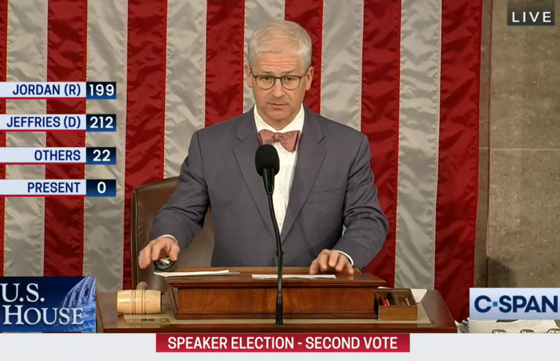After the Biden administration on Friday unveiled its supplemental funding request to Congress, which would allocate $100 billion of U.S. aid to Israel and Ukraine, House Republicans told the Daily Caller News Foundation they opposed the plan and called for both countries’ aid to receive separate votes.
Biden, in a speech from the Oval Office on Thursday, said that a failure to pass a joint aid package would “reward terrorists and dictators and embolden them to continue their assaults on democracy,” with a letter from the Office of Management and Budget Director Shalanda Young to acting House Speaker Pro Tempore Patrick McHenry on Friday explaining the details of the president’s proposal. House Republicans, in response, attacked and ridiculed the package to the DCNF, while insisting that aid for both countries be separately considered. (RELATED: ‘Unconscionable’: House Republicans Slam Effort To Couple Aid To Israel With Aid To Ukraine)
“This is the worst thing that could be done for Israel. Let’s deal with it a la carte,” said Republican Rep. Mike Garcia of California’s 27th District to the DCNF. On Ukraine, he slammed the distribution of funding that skewed in favor of the country, saying, “We have no strategy and no exit strategy, yet $61 billion being given to Ukraine. Israel needs to go first. We can’t sign up to Biden’s blank check policy on Ukraine,” while also noting that he’d release a white paper on the subject, later.
Supplemental Funding Request Letter by Daily Caller News Foundation on Scribd
“We need to support Israel first,” said House Judiciary Committee Chairman Jim Jordan to the DCNF, shortly before he entered a Republican Conference meeting where he was removed as the party’s nominee for speaker of the House. “Let’s have them done separately,” said Republican Rep. Thomas Massie of Kentucky’s 4th District to the DCNF.
The letter’s appendix listed the military aid that would be allocated to Ukraine and Israel, with among the biggest single expenditures being $30.6 billion for “operations and maintenance” of the military “to respond to the situation in Ukraine and for related expenses.” The same “operations and maintenance” request for aid to Israel, by contrast, is $4.4 billion.
“We resolved to have single-subject appropriations bills. I want to see them voted upon separately. I think the rest of the conference does too,” said Republican Rep. Michael Cloud of Texas’ 27th District to the DCNF. This was underscored by Texas Republican Reps. Pat Fallon of the 4th District and Chip Roy of the 21st District, who told the DCNF that any funding would have to be offset by spending cuts, elsewhere, saying “[i]t’s got to be paid for.”
Beyond military aid, Biden’s request includes $10.5 billion for the Department of State to assist internally displaced persons inside Ukraine and Israel. “There are an estimated 16 million people in Ukraine and more than 6.3 million refugees in the region who rely on humanitarian assistance,” the request letter reads, adding that “[f]unding would also provide life-saving humanitarian assistance in Israel and in areas impacted by the situation in Israel.”
Many members expressed disbelief that Biden would propose any supplemental request. “Ukraine has already taken $113 billion of our dollars. Israel has just been attacked. We need to get aid to Israel,” said Republican Rep. George Santos of New York’s 3rd District. “I don’t support it. Only 10% going to Israel? Really?” said Republican Rep. Tim Burchett of Tennessee’s 2nd District, to the DCNF.
Republican Rep. Mike Gallagher of Wisconsin’s 8th District, meanwhile, was incredulous about the package when Congress had not yet passed the Defense Appropriations Act for Fiscal Year 2024. “What are they supplementing? We haven’t even passed the defense bill,” he angrily told Garcia and the DCNF as he walked by in a Capitol basement hallway.
The Biden administration has hoped to solicit Republican support for the plan with the inclusion of funding for border security along the U.S. international border with Mexico, which has been a pet peeve of both Republicans and metropolitan Democratic officials amid a migration crisis.
“This request includes resources for an additional 1,300 border patrol agents to work alongside the 20,200 agents already funded in the FY2024 Budget; 375 immigration judge teams to strengthen the immigration court system—the largest incremental request ever,” Young wrote in her letter. Garcia balked at this request. “They want more funding for the border? They have a bad border policy,” he said.
Some House Republicans, however, have said that they support the package. “I’ll support them individually or together,” said Republican Rep. Brian Fitzpatrick of Pennsylvania’s 1st District. “I’ll be happy to vote for both,” said Republican Rep. Carlos Giménez of Florida’s 28th District. “However, I want a separate vote for both. Others in the conference who support one but oppose the other should be heard and respected.”
Young’s letter does not constitute legislation, which must be introduced by a member of Congress, and has made some Republicans hesitant to express an opinion about the matter before a bill is presented. “I think those priorities should be dealt with separately. However, I haven’t seen the package so I can’t say. The number is quite high,” said Republican Rep. Ken Buck of Colorado’s 4th District, to the DCNF.
“Let’s see. We need a goal and a strategy,” Republican Rep. Mike Waltz of Florida’s 6th District told the DCNF, when asked if he’d support the package. The House of Representatives has not considered any legislation since Oct. 3, following the removal of Kevin McCarthy as speaker of the House after the passage of a resolution sponsored by Republican Rep. Matt Gaetz of Florida’s 1st District with Democratic support, who noted to the DCNF that he wanted to separate Israeli and Ukrainian aid. The process of electing a new speaker has affected Republicans’ consideration of the bill, with some saying they’re entirely focused on such an election.
“I’m focused on the leadership before we work on that,” said Republican Rep. Dusty Johnson of South Dakota’s at-large district to the DCNF. “You really can’t even deal with that package until we have an operational House of Representatives,” said Republican Rep. Byron Donalds of Florida’s 19th District.
While Young’s letter was addressed to McHenry, the Senate would be the earliest venue where the bill could be considered and passed. Funding for Ukraine was not included in a continuing resolution passed on Sept. 30 to avoid a government shutdown, while Israel currently receives only regular military aid appropriated before its ongoing conflict with Hamas.
The White House and McHenry did not immediately respond to the DCNF’s request for comment.
Arjun Singh on October 20, 2023












